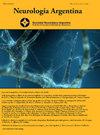Miopatías por defectos en la beta oxidación de ácidos grasos. Deficiencia de 3-hidroxiacil CoA-deshidrogenasa de cadena larga/complejo proteico trifuncional mitocondrial LCHADD/TFP una entidad con tratamiento específico
Q4 Medicine
引用次数: 0
Abstract
The b-oxidation of fatty acids is a critical physiological process that allows the use of fat as a source of energy in times of stress and fasting. Isolated long-chain 3-hydroxyacyl CoA dehydrogenase deficiency (LCHADD) (OMIM#609016) is an autosomal recessive disease that affects the metabolism of long-chain fatty acids and is secondary to mutations in the HADHA gene. Clinical symptoms are heterogeneous and develop progressively with exacerbation episodes mainly during episodes of intercurrent illness or fasting due to increased energy needs. A 36-year-old patient presented with progressive weakness in both lower limbs with distal onset and proximal progression associated with episodes of rhabdomyolysis that are triggered by a febrile syndrome. Clinical examination demonstrated the presence of surgical ankylosis of the ankle joint, weakness when flexion of the thigh over the pelvis 4/5 and flexion of the leg over the thigh 4/5, muscle hypotonia and posterior compartment muscle atrophy of the leg, areflexia of the lower limbs with preserved reflexes in the upper limbs. Given the suspicion of a possible metabolic myopathy, a dosage of acylcarnitines is requested where an increase in C16OH, C18OH, C18:20H and C18:10H is observed, and given these results, the HADHA gene is evaluated, demonstrating the presence of the variant c.2231delT, which promotes a change in the reading matrix from this point on, with the consequent creation of a premature stop codon for protein translation. The diagnosis of LCHADD deficiency is established by demonstrating an elevation of long-chain fatty acids, hydroxyacylcarnitine species in plasma, and/or increased excretion of 3-hydroxy-dicarboxylic acids in urine in combination with identification of biallelic pathogenic variants in HADHA or HADHB by molecular genetic testing.
由脂肪酸氧化缺陷引起的肌病。缺乏3-羟基辅酶a脱氢酶长链/线粒体三功能蛋白复合物LCHADD/TFP
脂肪酸的b氧化是一个关键的生理过程,它允许在压力和禁食时使用脂肪作为能量来源。分离的长链3-羟基酰基辅酶a脱氢酶缺乏症(LCHADD) (OMIM#609016)是一种常染色体隐性遗传病,影响长链脂肪酸的代谢,继发于HADHA基因突变。临床症状是异质的,主要在并发疾病发作或因能量需求增加而禁食时加重发作。36岁患者表现为双下肢进行性无力,远端起病,近端进展与发热综合征引发的横纹肌溶解发作相关。临床检查显示存在踝关节手术强直,大腿在骨盆上屈曲4/5和腿在大腿上屈曲4/5时无力,肌肉张力低下和腿后筋室肌萎缩,下肢反射性屈曲,上肢反射保留。考虑到可能的代谢性肌病的怀疑,在观察到C16OH, C18OH, C18:20H和C18:10H增加的地方,需要使用酰基肉碱剂量,并根据这些结果,评估HADHA基因,证明变异c.2231delT的存在,从这一点开始促进读取矩阵的变化,随后产生蛋白质翻译的过早停止密码子。LCHADD缺乏的诊断是通过证明血浆中长链脂肪酸、羟酰基肉碱种类升高,和/或尿液中3-羟基二羧酸排泄增加,并通过分子基因检测确定HADHA或HADHB的双等位基因致病变异来建立的。
本文章由计算机程序翻译,如有差异,请以英文原文为准。
求助全文
约1分钟内获得全文
求助全文
来源期刊

Neurologia Argentina
Medicine-Neurology (clinical)
CiteScore
0.50
自引率
0.00%
发文量
34
期刊介绍:
Neurología Argentina es la publicación oficial de la Sociedad Neurológica Argentina. Todos los artículos, publicados en español, son sometidos a un proceso de revisión sobre ciego por pares con la finalidad de ofrecer información original, relevante y de alta calidad que abarca todos los aspectos de la Neurología y la Neurociencia.
 求助内容:
求助内容: 应助结果提醒方式:
应助结果提醒方式:


